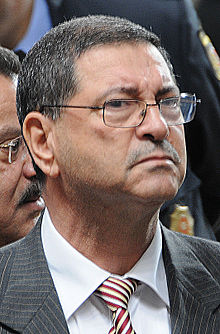Habib Essid
| Habib Essid | |
|---|---|
 |
|
| Head of Government of Tunisia | |
|
In office 6 February 2015 – 27 August 2016 |
|
| President | Beji Caid Essebsi |
| Preceded by | Mehdi Jomaa |
| Succeeded by | Youssef Chahed |
| Minister of the Interior | |
|
In office 28 March 2011 – 24 December 2011 |
|
| Prime Minister | Beji Caid Essebsi |
| Preceded by | Farhat Rajhi |
| Succeeded by | Ali Laarayedh |
| Personal details | |
| Born |
1 June 1949 Sousse, Tunisia |
| Political party | Independent |
| Alma mater |
Tunis University University of Minnesota, Twin Cities |
| Religion | Islam |
Habib Essid (Arabic: حبيب الصيد; born 1 June 1949) is a Tunisian politician who was Prime Minister of Tunisia from 6 February 2015 to 27 August 2016. He was the first prime minister to be appointed following the adoption of the new constitution and thus considered to be the first prime minister of the Second Tunisian Republic. He previously served as Minister of the Interior in 2011.
Born in Sousse in 1949, Essid received his master's degree in economics from Tunis University and added a masters programme in agricultural economics from the University of Minnesota.
He started his career in the public sector, notably in the Ministry of Agriculture. In 1993, he was named cabinet director at the Ministry of Agriculture, remaining in that post until 1997. He later served as cabinet director at the Ministry of the Interior. In 2001, he was appointed as Secretary of State for Fishing and later on as Secretary of State for the Environment. From 2004 to 2010, Habib Essid was Executive Director of the International Olive Council, headquartered in Madrid.
After the Tunisian Revolution, he was appointed as Minister of the Interior in the government of Prime Minister Beji Caid Essebsi on 28 March 2011. He was also chosen by Hamadi Jebali to be his Security Advisor following the 23 October 2011 elections.
On 5 January 2015, Essid was nominated as Prime Minister by Nidaa Tounes and asked to form a new government.
Initially, he formed a government composed of two political parties: Nidaa Tounes and the Free Patriotic Union. Following the announcement, all excluded political parties rejected the formation, leaving Essid short of the required 109 seats needed to obtain confidence.
...
Wikipedia
